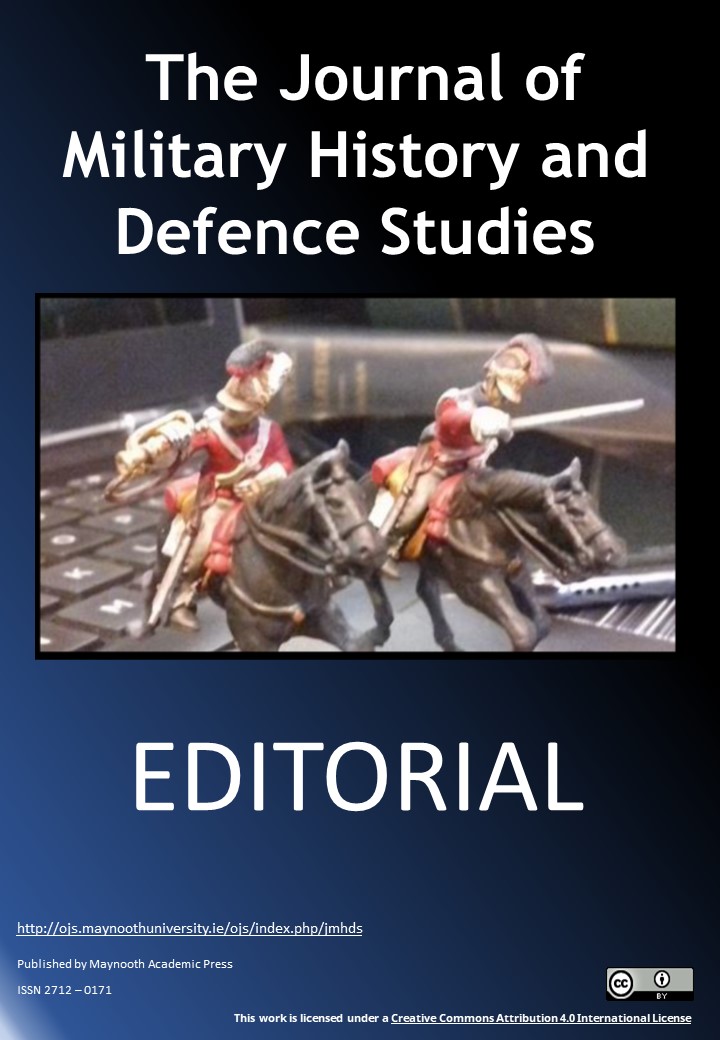Editorial
Keywords:
EditorialAbstract
Welcome to the third volume of the Journal of Military History and Defence Studies. As regular readers will know, the aim of this journal is to publish original research in military history and defence studies, defined broadly to include the history of war and of militaries, in addition to the study of war, strategy, security and military organisation yesterday, today and into the future. A core aim of this journal is to provide an outlet for high quality original research by new researchers and also by military personnel, and this is reflected in the contributions in this volume.
In the last edition of this journal the editorial noted that the world was not becoming a safer place with the passage of time. Sadly that message has been reinforced by subsequent events, most obviously with Russian invasion of Ukraine and an ongoing conflict that has global impact. That war illustrates, once again, the price enacted on ordinary people for the aggressive design of others. It also shows the continued relevance of conventional forces, even within a hybrid conflict, and Ukrainian forces supported by western supplied arms have succeeded (so far) in frustrating a larger force whose operations appear to be characterised by poor leadership, logistical incompetence, and tactical ineptitude. However, it is likely that the Russians will learn from their initial mistakes and, sadly, it seems that this war is far from over. It may be too early to draw definitive conclusions from that conflict, but what does seem apparent is the need for armed forces to pay attention to qualitive as well as quantitative factors, and think carefully how to adapt to the conditions of war in the twenty-first century.
Barriers to successful adaptation are explored by Kyle Peatfield in an article that examines how organisational culture can undermine the military’s ability to adapt appropriately to the challenges and opportunities presented by new technology. Noting how the US Army Modernisation Strategy depends on the successful integration of new technology, Peatfield explores key factors that influence this process and the wider management of change, arguing that military culture can inhibit successful adaptation, acting as a proverbial roadblock. One solution, identified by the author, is the adoption of a process or framework, such as that set out in Kotter’s eight-step change management theory, and also the development of formal change management training within structures for Professional Military Education. Leaders may not intuitively know how to manage change (even if they think they do) but they can be educated to do so.
The second paper is historical in outlook. George Sayen provides a detailed analysis of the pivotal Battle of the Sakarya River in 1921, a failed Greek offensive that represented the high water mark for the Greek Field Army of Asia Minor in its campaign against Turkish forces during the Greco-Turkish War, 1919-22. Utilising both Greek and Turkish sources, and reflecting on subsequent commentary on the battle, Sayen employs the ideas of Carl von Clausewitz to unpick the choices available to Greek commanders. Noting that most commentators employ Clausewitz’s notion of a ‘culminating point’, and criticise the Greek decision to launch an attach that in retrospect appeared doomed to fail, Sayen argues that the contrasting ‘principle of continuity’ may equally apply, suggesting that an alternative approach might have brought positive result and that victory offered at least some prospect of strategic success. In contrast, retreat without battle might only have delayed eventual defeat. He provides a fascinating account of a battle that has hitherto received too little attention.
The final full article is provided by Stephen MacEoin, who explores the commemoration (or lack of commemoration) within Ireland of those members of the National Army who died in defence of the new state in that country’s civil war from 1922-3. He identifies that, while Ireland has come to terms with the commemoration of those Irish who served with British forces in two World Wars, and the republican tradition is actively celebrated and commemorated, there is a collective amnesia related to the soldiers who died defending the state (and the elected government) from recalcitrant rebels. Drawing on themes of inclusiveness and ethical remembering, he explores the reasons for and extent of this amnesia and argues that the inconsistencies in the Irish commemorative landscape contradict the notion of real inclusiveness. He contrasts this with an exploration of Spanish remembrance and commemoration of their own dead in their Civil War, concluding that the dead of the National Army have not been remembered or commemorated appropriately.
This edition includes an entirely new section, entitled “10 minute readsâ€. The aim here is to provide interesting articles short enough literally to be read in ten minutes. Necessarily these lack the depth and detail of the main articles, but give authors the chance to provide a short, sharp analysis. We include two such papers here. The first, by Christopher Bonus, explores the role of soft paper as a tool of statecraft in the twenty-first century. The second, by Cian Moran, addresses the role of ethics and public opinion within military strategy. We hope that you find these stimulating, and we encourage readers to consider submitting their own work for inclusion in this section (using the appropriate link on the journal’s website).
As ever, we hope that you enjoy reading this edition of the journal and that you return to us for future editions. We also hope that you are enthused to undertake your own research into military history and defence studies and that you may, in future, decide to submit your work for inclusion in this journal
Finally, please note that whatever the affiliation of the author, all views expressed here and elsewhere in the journal represent those of the author alone. They should not be taken to represent the views or opinions of any other group or organisation.
The editor
September 2022


 This work is licensed under a
This work is licensed under a 
